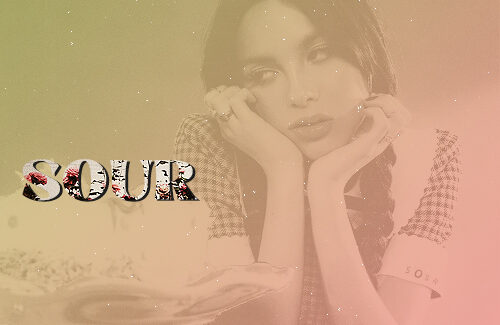Lowercase girls tend to fly under the radar by design, but once you start looking you’ll see them everywhere. For one thing, they’ve been all over the streaming charts in the past few years: folklore, evermore, “thank u, next,” girl in red, mxmtoon, dodie, beabadoobee, how i’m feeling now, “drivers license,” “deja vu,” “good 4 u” — to name just a few recent, femme-forward musical phenomena that wouldn’t even think of imposing the tyranny of capital letters on the listener’s imagination.
But lowercase girls have been there forever, in the back rows of classrooms and the corners of parties, daydreaming, doodling, stockpiling vivid details and observations in the marble notebooks of their minds — waiting for the precise moment to launch them like a carefully crafted dart that punctures everybody else’s apathy and proves just how sharply she has been paying attention. Some of the best of them never grow out of it. “My only advantage as a reporter,” Joan Didion wrote in 1968, unwittingly describing her own species perfectly, “is that I am so physically small, so temperamentally unobtrusive, and so neurotically inarticulate that people tend to forget that my presence runs counter to their best interests. And it always does.” Beware the lowercase girl. Although she is usually overlooked, underestimated and even ignored, she sometimes turns out to be the one who’s been writing the story all along.
Such were the cultural forces that Olivia Rodrigo harnessed, streamlined and gloriously melo-dramatized earlier this year in her breakout single, “drivers license” — stylized all lowercase, because of course. A lifelong Swiftie (almost literally: When Taylor Swift’s self-titled debut album came out, Rodrigo was 3) and the daughter of a therapist, Rodrigo was raised to be the kind of person who didn’t exactly hide her feelings. On the chorus of the song that accelerated her to overnight fame, she saves her most impassioned vocal delivery for what she clearly considers to be her ex’s most grievous crime: Guess you didn’t mean what you wrote in that song about me. The implication being that in her songs, defiantly, she means every word.
In the last few years, given the success of Billie Eilish’s ASMR jams and Swift’s soft acoustic reveries — “lowercase girl album” bona fides that were documented by Jill Gutowitz in Vulture last year — it has sometimes felt like pop musicians are playing one big round of the Quiet Game, daring each other into an ever more provocative hush. “drivers license” certainly benefits from that tonal shift, but the most moving thing about the song is actually its careening sense of dynamism, the way it swings repeatedly from a private muttering to a collective, belt-it-out exorcism of the heart. Such is the power of That Bridge. (Perhaps the surest indication of the song’s massive, cross-generational appeal is the fact that its bridge inspired both a TikTok challenge and an SNL skit — some kids may have been editing their small-screen video responses to it as their parents watched the episode on some old technological innovation called live TV.) Rodrigo’s songs play out like bottled-up soliloquies rather than two-sided conversations, which gives them the emotional force of someone who has previously felt unheard (by an apathetic boyfriend, or maybe by adult society writ large) finally speaking her mind. And so that bridge exposes the great irony of not only “drivers license,” but the lowercase girl herself. Because on the inside, where all the feelings are, her caps-lock key is JAMMED.
“drivers license” would have been a hard act for any new artist to follow, but in the past month, Rodrigo has seized every opportunity to prove that there’s more to her than even that song could fully showcase. The two singles she’s released in the lead-up to her debut album, Sour, have effortlessly slipped into unexpected genres — who among us could have predicted that the “drivers license” girl would go scorched-earth pop-punk on her third single, or that she’d pull it off? — and both have been sprinkled with striking, cleverly documented observational details. “Trading jackets, laughing ’bout how small it looks on you,” she sings on the hypnotic “deja vu,” as a chorus of backup Olivias exhale a scathing line of canned, can-barely-be-bothered laughter at such a romantic cliché: ha-ha-ha-ha-ha-ha-ha. “Guess the therapist I found for you, she really helped,” she shrugs on “good 4 u” — one of those kung fu lyrics that cuts its intended target in seven different places before he even realizes he’s bleeding. Rodrigo’s songs have lived-in details to spare, as though she had all this time been assembling a detailed dossier on the emotional minutiae of the teenage experience.
The remarkably potent Sour, out today, plays a similar game of bait-and-switch with expectations. Far from the muted chords of “drivers license”—and worlds away from the musical-theater sheen of her songs for Disney+’s High School Musical: The Musical: The Series — the album’s opening track, “brutal,” crashes in with a torrent of loud, crunchy guitars, overtop of which Rodrigo’s dryly compressed voice lists a seemingly unending string of adolescent neuroses: “And I don’t stick up for myself / I’m anxious and nothing can help / And I wish I’d done this before / And I wish people liked me more.” The and and and and’s pile up like a teetering Jenga tower of stress. Rodrigo proved on “good 4 u” that she can do a very effective vocal sneer, and on “brutal” she saves her most caustic one for the adults who insist, in their rose-colored recollections, that their teenage years were the best of their lives. “I’m so sick of 17,” she sighs, “where’s my f****** teenage dream?!” It’s an exhilarating lyric, an expertly calibrated eye roll at anyone over the age of 18 — or maybe even at the previous generation’s entire philosophy about how pop music should be made.
“I’m very emo,” Rodrigo said in a recent Rolling Stone video interview, sitting beside her co-writer and producer Dan Nigro. “Dan was in an emo band, and he still tells me I’m emo — that’s how you know you’re really emo.”
Now 39, Nigro used to be the frontman of the Long Island-based band As Tall as Lions, who found moderate success in the booming East Coast emo-punk scene of the early aughts. He might seem an unlikely musical partner for Rodrigo, until you remember that perhaps the most prominent current producer of pop music made by young women, Jack Antonoff, is a veteran of the very same scene. (His first band, New Jersey-based Steel Train, was signed to the beloved, influential pop-punk label Drive-Thru Records.)
But as a one-time lowercase girl / emo kid / Drive-Thru Records enthusiast from suburban New Jersey, I do find it pretty surprising that two of the most successful producers in crafting pop music from a feminine point of view came out of that scene. Because, as I remember all too well, it was a realm almost entirely devoid of women’s voices.
“From my early-to-mid adolescence,” I wrote years ago in a reassessment of this period in my music-obsessed life, “I listened almost exclusively to music made by sad boys.” And it wasn’t just that girls’ perspectives were absent from this music that I loved so passionately during this confusing and hormonally tumultuous time: The Girl was always the reason the boys were sad. In these songs, she was often actively vilified, blamed for the Lead Singer Boy’s every earthly woe — and not infrequently the star of his violent revenge fantasies. “Even if her plane crashes tonight she’ll find some way to disappoint me,” went a song I can still sing by heart as an adult, “by not burning in the wreckage, or drowning at the bottom of the sea.” This was, to me, romantic, melodramatic, deep. I doodled lyrics like those on the backs of worksheets, in the margins of my diary. I played guitar — much better than I ever gave myself credit for then — but was too shy to be in a band, so I resorted to playing covers of those sorts of songs alone in my bedroom. Maybe I would have uploaded them to YouTube if it had existed.
I gravitated toward emo and punk music because I was seeking out some sort of alternative to life as I knew it, so I think if Olivia Rodrigo had existed when I was a teen I would have at first been a little skeptical of her mainstream popularity, her preternatural poise, her Disney past. But in the end I have to think I would have been pulled in by the oceanic undertow of her music’s subjectivity, an exquisitely detailed, deeply felt, young girl’s perspective that was woefully lacking in the music I listened to when I myself was learning how to parallel park.
Nigro’s production style for Rodrigo is both playful and atmospheric, conjuring a kind of dreamy internal space in which it seems like the listener is eavesdropping on the singer’s thoughts and impressions. Seemingly small, intimate moments — an ex sharing a Billy Joel song with his new flame, say, in “deja vu” — are underscored with operatic flair. Though updated for this world of social media surveillance and stream-of-consciousness text messages, this approach isn’t exactly new. It’s basically the foundation of modern pop music as we know it, dating back to the youth-oriented concerns of Brill Building songwriters in the 1950s and the early 1960s girl groups whose adolescent experiences were dramatized into three-minute symphonies thanks to Phil Spector’s “Wall of Sound.”
But also: No thanks to Phil Spector. Because his unavoidable centrality in the story of modern pop music also reminds us that it is an industry with a long, troubling history of exploiting — or worse — the affective labor of teenage girls. Accusations of abuse now also loom over the previous generation’s most influential pop hitmaker, Dr. Luke — ironically the architect of so-called “empowering” female-driven millennial pop anthems like “Roar,” “Since U Been Gone” and, yep, f-ing “Teenage Dream.”
Rodrigo’s creative partnership with Nigro, though, seems to fit within a newer paradigm of pop star/producer power dynamics. Much like Antonoff’s pairings with some of the artists who have most directly inspired Rodrigo (Swift, Lorde, Lana Del Rey), and even a little like the intimate workings of Eilish’s bedroom pop laboratory with her brother Finneas, Rodrigo and Nigro present their work to the world as the result of a genuine, non-hierarchical collaboration. “I realize I’m okay at navigating my job because I played in a band for 10 years with three other very emotional, crazy people — myself probably being the most emotional crazy of the four of us,” Nigro told Vice earlier this year. “Having those experiences with my bandmates has really helped me work with so many different artists, because I’m able to understand what they’re going through and get them to feel open enough to be who they actually are.”
But maybe that supposedly “new” paradigm also has crucial antecedents scattered throughout musical history, too. Nigro’s language there bears a striking resemblance to the way Alanis Morissette has described her creative partnership with producer Glen Ballard, with whom she first worked on another album with which Sour finds cross-generational echoes: Jagged Little Pill. “glen’s presence with me had no agenda,” Morissette reflected in a 2015 essay commemorating the 20th anniversary of that landmark album and written — it must be said — all in lowercase letters. “this presence and this lack of projecting onto me ‘what i should be’ was the ultimate freedom and support i needed to crack open.”
In that essay, Morissette acknowledges that part of her success was lucky timing: In the mid-’90s there was suddenly, she writes, “a readiness, perhaps, for people to hear about the underbelly, the true experience of being a young, sensitive, and brave person in a patriarchal world.” That moment proved to be fleeting, though, and by the early aughts and my early teens the mainstream culture had shifted back to its norm of only caring about macho, masculine angst. Any girl trying to use the idioms of punk or emo to express herself — like, say, Avril Lavigne — was immediately regarded as an intruder, a poser or a sell-out until proven otherwise.
What I realize when I reflect back on the silent voices of my youth, though, is that we girls had so much to rage and yell and be sad about — maybe even more than the boys ever did. Because for all the sense of community it gave me in connecting with like-minded friends, the punk and emo scene often still replicated the most misogynistic impulses of the broader culture. Something I have been sitting with for the past few years, and which I have not even known how to begin to process, is that the songwriter and frontman of my favorite emo band — the one who wrote those plane-crash lyrics I sang along to endlessly — was accused of sexual misconduct by girls who, at the time, were about the same age that I was when I idolized him. When I think too hard about that, I want to scream until my lungs explode.
Rodrigo and her peers have come of age at a time when a lot of the gender norms that reinforce those exploitative power dynamics are breaking down, in part because most of them grow up with an awareness and acceptance of gender fluidity. Terms like “lowercase girl,” or just “girl,” are more pliable, inviting and optional than they used to be. Some very popular, very emotional musicians have also paved certain paths, whether that’s Swift, Lorde, or Paramore’s Hayley Williams. Even if I didn’t always hear it affirmed in my own adolescence, it’s heartening to now hear Rodrigo asserting, from the top of the charts, that girls have plenty to be emo about.
As Sour progresses, the ability to feel deeply and express herself becomes Rodrigo’s superpower. “Maybe I’m too emotional, or maybe you never cared at all,” she sings on the searing bridge of “good 4 u.” It’s not her, it’s him, she concludes, diagnosing an unfeeling ex as acting “like a damn sociopath.” Rodrigo refracts the shattering experience of first heartbreak through a multitude of different moods and genres, and it’s a testament to her transfixing strengths as a songwriter and a vocal performer that it only starts to feel repetitive one song from the end.
Some of the most promising moments on Sour come when Rodrigo widens her view beyond The Boy or even herself, toward the larger forces keeping kids of her generation feeling so emo. “jealousy, jealousy” fixes its frustration on the picture-perfect distortions of influencer culture: “I kinda wanna throw my phone against the wall,” Rodrigo groans. In response to a culture saturated with quick-fix life hacks, self-help truisms and therapy-speak, Rodrigo is refreshingly good at illuminating the space between what she knows she should feel and what she actually does feel. “I know their beauty’s not my lack,” she sings, harmonizing with herself so that the line sounds like one of those annoyingly tidy Instagram graphics with an inspirational note written in cursive. “Never doubted myself so much, like am I pretty, am I fun, boy?” she sings, airing her insecurities on the stirring “1 step forward, 3 steps back” (a song that interpolates, with permission, the piano riff from Taylor Swift’s “New Year’s Day” — the ultimate baton-pass). “I hate that I give you power over that kind of stuff,” Rodrigo sighs. And yet, how could she not? It’s brutal out there.
The final song on Sour finds one last opportunity to flip expectations. “hope ur ok” is not — as its title might suggest — a feel-good message to the ex of “drivers license,” thus cleanly and cathartically closing the narrative loop. It is instead a series of character sketches of kids Rodrigo once knew well and lost touch with over the years. Each of them carries their own trauma, which Rodrigo sketches in empathetic, economical writing (“he wore long sleeves ’cause of his dad”). The song is sad but hopeful, radically unsettling at times, and almost disarmingly earnest in its benevolently universal well-wishing. Again, Rodrigo plays the girl who’s always been observing everyone around her with a gimlet eye, whether they realized it or not. Maybe, she seems to be concluding on behalf of her much-misunderstood generation, this is a more realistic teenage dream. Not to be ecstatic, euphoric, eternally empowered. Just to be — as Rodrigo puts it in unpresuming lowercase — “ok.”
SOURCE: NPR.org











